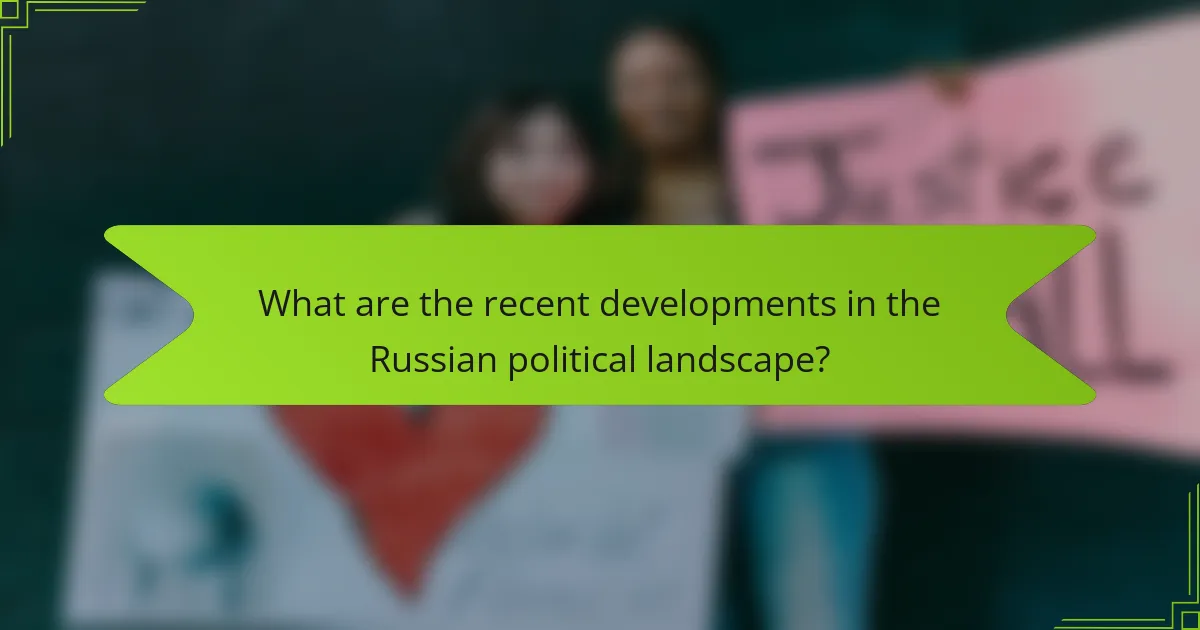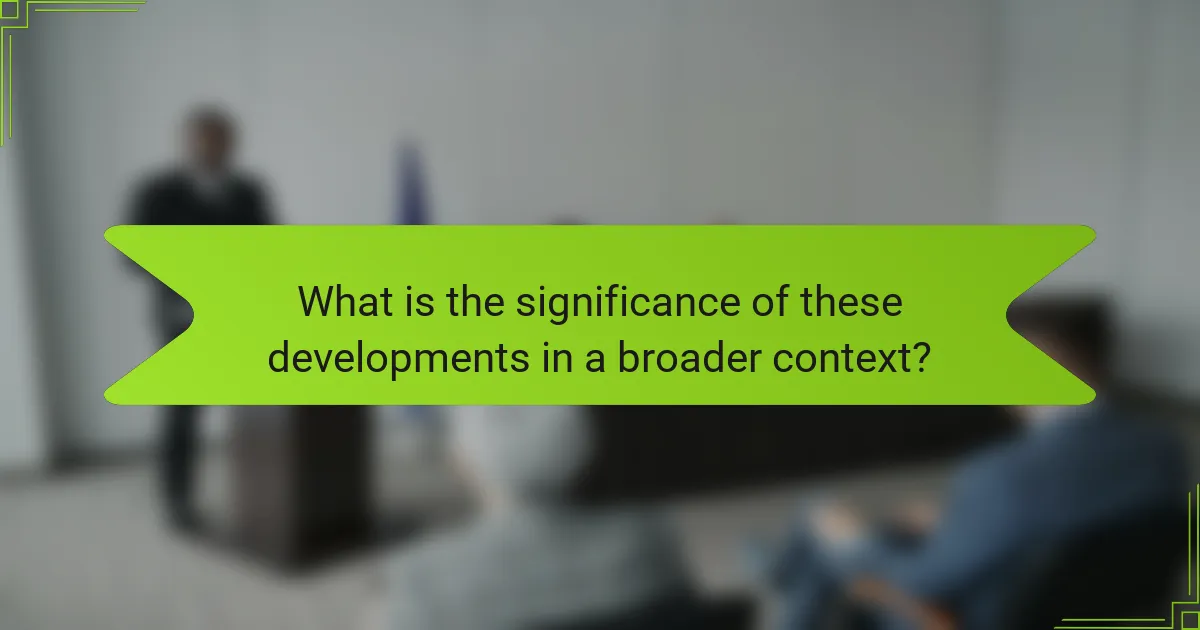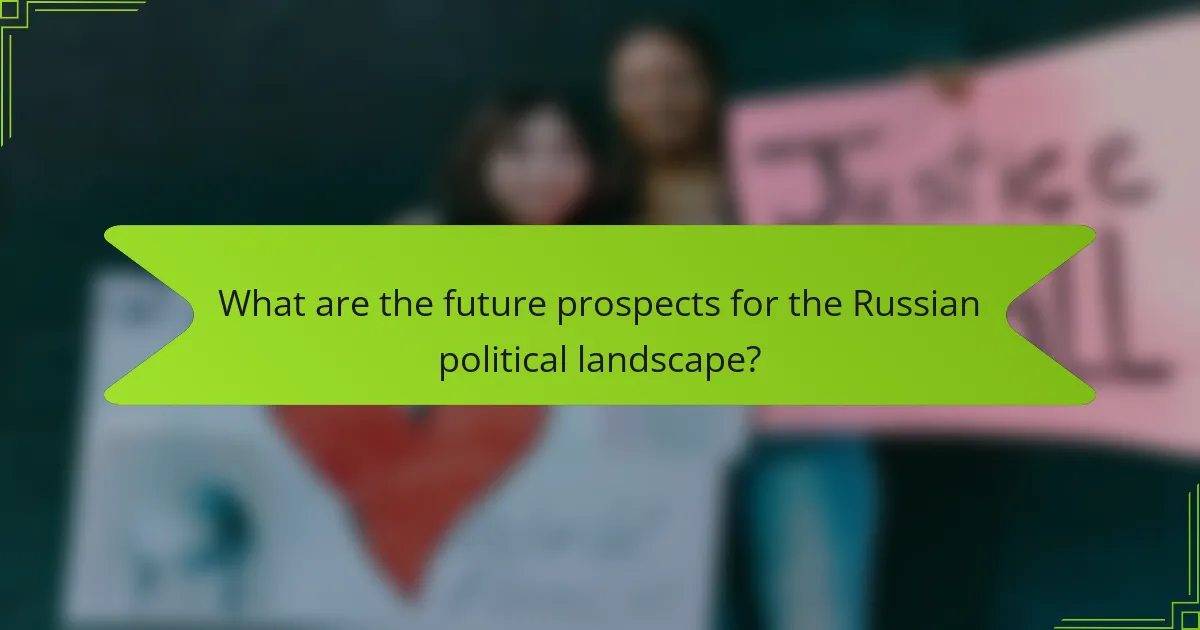The article focuses on recent developments in the Russian political landscape, highlighting increased tensions between the government and opposition groups. Notable events include widespread protests in 2023 over economic issues, which were met with police crackdowns and arrests of activists. Changes in key leadership positions within the government suggest a potential consolidation of power amid rising public discontent, while legislative measures aim to limit dissent and control media narratives. These dynamics indicate a shift towards a more authoritarian governance style, reflecting the complexities of public sentiment and the influence of historical patterns on Russia’s future political trajectory.

What are the recent developments in the Russian political landscape?
Recent developments in the Russian political landscape include increased tensions between the government and opposition groups. In 2023, protests erupted over the government’s handling of economic issues. These protests were met with significant police presence and arrests of activists. Additionally, there have been reports of changes in key leadership positions within the government. Analysts suggest these changes may be an attempt to consolidate power amid growing discontent. Furthermore, legislative actions have been taken to limit dissent and control media narratives. These developments indicate a shift towards a more authoritarian approach in governance.
How have key events shaped the current political environment in Russia?
Key events have significantly shaped the current political environment in Russia. The annexation of Crimea in 2014 marked a pivotal moment, leading to increased tensions with the West. This event solidified President Vladimir Putin’s popularity domestically. The subsequent sanctions imposed by Western nations further isolated Russia economically and politically.
The protests in 2011 against alleged electoral fraud highlighted public discontent and prompted a crackdown on dissent. The 2020 constitutional amendments allowed Putin to extend his presidency, reinforcing his grip on power. Additionally, the ongoing conflict in Ukraine has intensified nationalistic sentiments, further consolidating support for the government.
These events have created a political climate characterized by authoritarianism, limited political pluralism, and state control over media. The combination of external pressures and internal dissent has shaped a complex landscape where the government maintains strict control to counteract opposition.
What major political events occurred in the last year?
Major political events in Russia over the last year include the ongoing conflict in Ukraine and significant domestic policy changes. The war in Ukraine escalated with increased military actions and international sanctions. Russia’s government implemented new laws restricting dissent and controlling media narratives. Additionally, there were notable shifts in leadership within regional governments. Public protests occurred in response to economic challenges and military mobilization. These events reflect the current state of Russia’s political climate and public sentiment.
How have these events influenced governmental policies?
Recent events in the Russian political landscape have significantly influenced governmental policies. Changes in leadership and public reactions have prompted the government to adjust its strategies. For instance, the annexation of Crimea in 2014 led to increased military spending and a focus on national security. The government’s response to public protests has resulted in stricter laws regulating demonstrations. Additionally, economic sanctions imposed by Western nations have forced Russia to pivot towards self-sufficiency in various sectors. These adaptations reflect a direct response to both internal and external pressures shaping policy decisions.
What leadership changes have taken place in Russia recently?
Recent leadership changes in Russia include the appointment of new regional governors and shifts in key ministerial positions. In September 2023, President Vladimir Putin appointed several new governors in response to local elections. These changes aim to strengthen regional governance and align local leadership with federal policies. Additionally, there have been adjustments in the Cabinet, with new ministers taking on roles to address economic challenges. These leadership shifts reflect ongoing efforts to consolidate power and adapt to the evolving political landscape in Russia.
Who are the new key figures in Russian politics?
It is not possible to provide a definitive answer to the question regarding new key figures in Russian politics. The political landscape is constantly changing, and specific names may vary based on recent events and developments. There is no concrete, up-to-date information available at this moment that identifies new key figures in Russian politics.
What impact do these leadership changes have on Russia’s political direction?
Leadership changes in Russia significantly influence the country’s political direction. These shifts can alter domestic policies and international relations. For instance, a new leader may prioritize different economic strategies or foreign alliances. Historical examples include the transition from Boris Yeltsin to Vladimir Putin in 1999, which marked a shift towards centralized power. Recent changes have also led to increased repression of dissent. This has resulted in a more authoritarian governance style, impacting civil liberties and political opposition. Consequently, leadership changes often reflect and reinforce broader trends in Russia’s political landscape.
How have public reactions been to recent political changes?
Public reactions to recent political changes in Russia have been mixed. Many citizens express concern over increased government control. Protests have erupted in major cities, reflecting dissatisfaction with leadership decisions. Some segments of the population support the changes, believing they ensure stability. Surveys indicate a significant portion of the public feels disconnected from political processes. Reports show that state media coverage influences public perception heavily. International responses also shape local opinions, with criticism from foreign governments prompting defensive attitudes. Overall, public sentiment remains polarized amid ongoing political shifts.
What are the main sentiments expressed by the public regarding political events?
The main sentiments expressed by the public regarding political events include discontent, support, and skepticism. Discontent often arises from economic challenges and perceived government corruption. Support is typically directed towards popular leaders or policies that resonate with the public’s needs. Skepticism emerges from distrust in the political process and media narratives. Recent surveys indicate that a significant portion of the population feels disillusioned with political institutions. For instance, a 2023 poll by the Levada Center found that 61% of respondents expressed dissatisfaction with the current political climate. These sentiments reflect a complex relationship between the public and political events in Russia.
How have protests or support movements manifested in response to leadership changes?
Protests and support movements have emerged as significant responses to leadership changes in Russia. Following leadership transitions, public sentiment often manifests through organized demonstrations. For instance, the resignation of President Dmitry Medvedev in 2012 sparked widespread protests against perceived political repression. In contrast, the election of Vladimir Putin in 2000 saw a surge in support rallies, reflecting nationalistic sentiments. These movements are often characterized by their demands for political reform or support for the new leadership. Historical events illustrate this pattern, such as the protests during the 2011 parliamentary elections, which were fueled by allegations of fraud. Additionally, the annexation of Crimea in 2014 led to a wave of patriotic support movements rallying behind Putin. Overall, public reactions to leadership changes in Russia demonstrate a complex interplay of dissent and support, shaped by the political context and societal values.

What is the significance of these developments in a broader context?
These developments in the Russian political landscape signify a shift in governance and public sentiment. Leadership changes often reflect underlying social tensions and economic challenges. The public reactions indicate a growing awareness and engagement among citizens. Historical context shows that such shifts can lead to significant policy changes. For instance, the 2011 protests against electoral fraud marked a pivotal moment in Russian politics. This highlights the potential for increased demands for democratic reforms. Overall, these developments could influence Russia’s future domestic and foreign policies.
How do recent events compare to historical political changes in Russia?
Recent events in Russia show similarities to historical political changes, particularly in authoritarian shifts. For instance, the consolidation of power under Vladimir Putin mirrors past leaders like Joseph Stalin. Both eras feature suppression of dissent and media control. The 2022 invasion of Ukraine has intensified state propaganda, reminiscent of Cold War tactics. Historically, events like the 1917 Bolshevik Revolution also involved significant public unrest and government crackdowns. Recent protests against the war echo the public dissent seen during the Soviet era. Overall, the trend of centralizing authority and limiting freedoms is a recurring theme in Russia’s political history.
What patterns can be observed in Russia’s political evolution?
Russia’s political evolution shows patterns of centralization and authoritarianism. Over the years, power has increasingly concentrated in the executive branch. The presidency has become a dominant force, especially under Vladimir Putin since 2000. Legislative bodies have seen reduced independence and influence. Political opposition faces significant repression and limited visibility. Media control has intensified, restricting free expression. Elections often lack genuine competition, undermining democratic processes. These patterns reflect a shift towards a more autocratic governance model. Historical events, such as the 2014 annexation of Crimea, further illustrate this trend.
How does the current political climate reflect past crises?
The current political climate in Russia reflects past crises through increased authoritarianism and public discontent. Historical events like the 1991 collapse of the Soviet Union and the 2008 financial crisis shaped this trajectory. The government’s response to dissent mirrors tactics used during previous upheavals. For example, the crackdown on protests in 2021 echoes the suppression of opposition seen in the 2000s. Economic sanctions and geopolitical tensions also resonate with past crises, influencing public sentiment and government policy. The reliance on state media to control narratives is a strategy reminiscent of Soviet-era propaganda. Overall, the current landscape showcases a pattern of reactionary governance in response to both internal and external pressures, much like in earlier periods of Russian history.
What implications do these changes have for international relations?
The changes in the Russian political landscape significantly impact international relations. Increased authoritarianism under current leadership may lead to heightened tensions with Western nations. This shift could result in a realignment of alliances, as countries reassess their positions. Economic sanctions imposed by various nations may escalate in response to internal policies. Additionally, Russia’s assertive foreign policy in regions like Ukraine and Syria complicates diplomatic negotiations. Increased military activity may provoke neighboring countries to strengthen their defense strategies. Historical context shows that such political shifts often lead to instability in international partnerships. Overall, these changes create a complex environment for global diplomacy and security.
How might leadership changes affect Russia’s foreign policy?
Leadership changes in Russia can significantly impact its foreign policy direction. New leaders may shift priorities based on their ideologies. For example, a more nationalist leader might adopt aggressive stances towards neighboring countries. Conversely, a leader with a focus on diplomacy could seek to improve relations with the West. Historical instances illustrate this; under Dmitry Medvedev, Russia pursued a more conciliatory approach compared to Vladimir Putin’s assertiveness. Changes in leadership can also influence military spending and alliances. For instance, a new administration may choose to strengthen ties with China or Iran. The overall geopolitical landscape may shift depending on the leader’s strategic goals. Thus, leadership changes are crucial in shaping Russia’s foreign policy trajectory.
What are the potential reactions from other countries to these developments?
Other countries may respond to developments in the Russian political landscape with increased diplomatic pressure. Nations could issue statements condemning actions that undermine stability. Economic sanctions may be considered as a tool for influencing Russian policy. Alliances might be strengthened among nations opposing Russian initiatives. Increased military readiness could be a response from neighboring countries. Humanitarian aid may be offered to support affected populations. International organizations may convene to address the situation. These reactions would be informed by historical precedents and geopolitical interests.

What are the future prospects for the Russian political landscape?
The future prospects for the Russian political landscape are uncertain and complex. The current leadership under President Vladimir Putin has maintained a tight grip on power. Political opposition faces significant challenges, including legal restrictions and repression. Economic sanctions from Western countries impact the overall stability of the regime. Public sentiment remains mixed, with some supporting the government and others expressing discontent. The upcoming elections may shape the political climate further. Analysts predict potential shifts depending on domestic and international pressures. Historical patterns suggest that the political landscape may evolve but will likely remain under authoritarian influence.
What trends are emerging in Russian politics?
Emerging trends in Russian politics include increasing centralization of power, state control over media, and suppression of dissent. The government is tightening its grip on political opposition. This is evident through recent crackdowns on protests and the imprisonment of opposition leaders. Additionally, the Kremlin is leveraging nationalistic rhetoric to bolster public support. The war in Ukraine has also shifted political dynamics, leading to a rally-around-the-flag effect among citizens. Economic sanctions are pushing the government to seek closer ties with non-Western countries. These trends indicate a move towards a more authoritarian political structure.
How might public opinion influence future elections?
Public opinion significantly influences future elections by shaping candidates’ strategies and policies. Politicians often adjust their platforms based on prevailing public sentiments. For instance, in Russia, public opinion can dictate the level of support for government initiatives. Polling data reveals voter preferences, which can sway campaign tactics. Additionally, public opinion can impact voter turnout. High engagement levels often correlate with more competitive elections. Historical trends show that shifts in public sentiment can lead to unexpected electoral outcomes. For example, the 2011 protests in Russia reflected discontent and influenced subsequent elections.
What role will social media play in shaping political discourse?
Social media will significantly influence political discourse by facilitating rapid information dissemination. It enables real-time communication between politicians and the public. Platforms like Twitter and Facebook allow for direct engagement and feedback. This immediacy can amplify political messages and mobilize grassroots movements. Studies show that social media shapes public opinion and political engagement. For instance, a 2020 Pew Research study found that 53% of social media users engage in political discussions online. Additionally, social media can create echo chambers, reinforcing existing beliefs. This duality presents both opportunities and challenges for democratic processes.
What strategies can citizens employ to engage with the political process?
Citizens can engage with the political process by participating in elections. Voting is a fundamental way to express opinions on leadership and policies. Citizens should stay informed about candidates and their platforms. Engaging in discussions with peers can also amplify awareness of political issues. Attending town hall meetings allows citizens to voice concerns directly to representatives. Joining advocacy groups can provide a platform for collective action on specific issues. Utilizing social media can help spread information and mobilize support. Lastly, contacting elected officials through emails or calls can influence decision-making.
How can individuals stay informed about political developments?
Individuals can stay informed about political developments by following reliable news sources. Regularly reading newspapers and online news platforms provides updates on current events. Subscribing to political newsletters offers curated information directly to inboxes. Engaging with social media accounts of credible journalists can deliver real-time updates. Attending public forums and discussions allows for direct engagement with political topics. Listening to podcasts focused on politics provides in-depth analysis and commentary. Watching political debates and discussions on television keeps individuals informed about differing viewpoints. Utilizing news aggregator apps can streamline access to various sources in one place.
What actions can citizens take to voice their opinions effectively?
Citizens can voice their opinions effectively by participating in public demonstrations. These events allow individuals to express their views collectively. Engaging in social media campaigns also amplifies their voices. Platforms like Twitter and Facebook facilitate widespread sharing of opinions. Writing to elected officials is another direct method. Citizens can articulate their concerns and suggestions through letters or emails. Joining civic organizations fosters community discussion and action. These groups often organize initiatives that represent collective interests. Additionally, voting in elections empowers citizens to influence political outcomes. Each of these actions contributes to a more engaged and informed populace.
The main entity of this article is the recent developments in the Russian political landscape. Key topics include increased tensions between the government and opposition groups, significant protests over economic issues, and recent leadership changes aimed at consolidating power. The article also examines the impact of historical events, such as the annexation of Crimea and the ongoing conflict in Ukraine, on current political dynamics. Public reactions to these developments are highlighted, showcasing a mix of support and discontent among citizens, alongside the implications for international relations and future political trends in Russia.